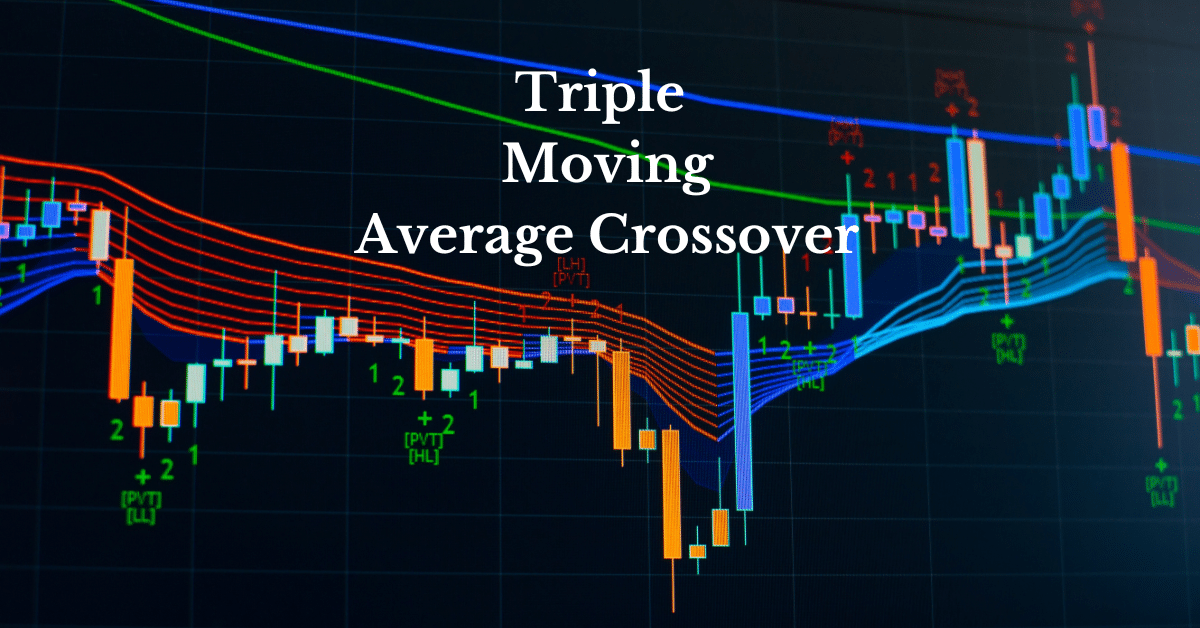Triple Moving Average Crossover is a trading strategy that uses three moving averages of different time frames to generate buy and sell signals for a financial instrument. It compares the interaction of a short-term moving average, a medium-term moving average, and a long-term moving average. A buy signal is generated when the short-term moving average crosses past the medium-term moving average, which in turn crosses above the long-term moving average. Conversely, a sell signal is generated when the short-term moving average crosses below the medium-term moving average, which crosses below the long-term moving average.
A triple moving average strategy is a technical analysis indicator that calculates the average price of an asset over a specific number of periods. The purpose of using three moving averages is to get a more comprehensive view of the trend of the financial instrument.

What is a sell signal?
A sell signal is a signal indicating that it is time to sell a financial instrument, such as a stock, currency, or commodity. In the context of technical analysis, a sell signal is generated by using technical indicators, such as triple moving averages strategy, chart patterns, or oscillators, to determine the direction of the trend of a financial instrument.
A sell signal is produced when the short-term moving average decreases below the medium-term moving average, and this, in turn, falls below the long-term moving average. This indicates that the trend of the financial instrument is bearish and that it is a good time to sell.
It’s important to note that the Triple Moving Average Crossover is just one of many technical analysis indicators traders use to make investment decisions. It is not a guarantee of future performance. It is crucial to use it in conjunction with other analysis techniques and have a solid understanding of risk management.

Explain in detail the triple moving average strategy:
The Triple Moving Average Crossover strategy, uses three moving averages. All with different periods to determine the trend of a financial instrument. These moving averages are:
- Short-term Moving Average: This moving average has a small number of periods, typically between 5 and 20, and is used to capture short-term price movements. The short-term moving average, which employs a limited number of periods, is highly responsive to price fluctuations and quickly displays shifts in trends.
- Medium-term Moving Average: This moving average has a more significant number of periods, typically between 50 and 200, and is used to capture intermediate-term price movements. Because it uses a larger number of periods, the medium-term moving average is less sensitive to price changes. It reflects trend changes more slowly than the short-term moving average.
- Long-term Moving Average: This moving average has the largest number of periods, typically between 200 and 500, and is used to capture long-term price movements. Because it uses an even larger number of periods, the long-term moving average is the least sensitive to price changes. It reflects trend changes even more slowly than the medium-term moving average.
What is the best moving average crossover combination?
The best combination of moving averages for the Triple Moving Average Crossover strategy is subjective and depends on the specific financial instrument, the trader’s investment goals, and the market conditions. There is no universally “best” combination of moving averages.
Traders may experiment with different combinations of moving averages to find the one that works best for them. Some traders prefer to use short-term moving averages with a small number of periods, while others prefer to use longer-term moving averages with a larger number of periods. The choice of periods will depend on the trader’s analysis and understanding of market conditions.
It’s important to remember that technical indicators, including moving averages, are just one aspect of a comprehensive trading strategy. The best combination of moving averages will depend on the trader’s overall market analysis, risk management, and investment goals.
Is moving average crossover strategy profitable?
The profitability of the Triple Moving Average Crossover strategy, including the Triple Moving Average Crossover strategy, depends on various factors such as the specific financial instrument, market conditions, and the trader’s execution of the strategy.
Like any trading strategy, there is no guarantee of profit with the Triple Moving Average Crossover strategy. The strategy can be profitable if the market conditions are favorable and the trader executes the strategy correctly. However, if the market conditions are not favorable or if the trader does not execute the strategy correctly, the strategy can result in losses.

Conclusion
The purpose of using the triple moving average strategy with different time frames is to get a comprehensive view of the trend of the financial instrument. By combining short-term, medium-term, and long-term price movements, traders can get a better idea of whether the trend of the financial instrument is bullish or bearish and make investment decisions accordingly.
It’s important to note that the choice of the number of periods for each moving average will depend on the specific financial instrument and the trader’s investment goals and time horizon. The choice of periods should be based on the trader’s analysis and understanding of market conditions.




